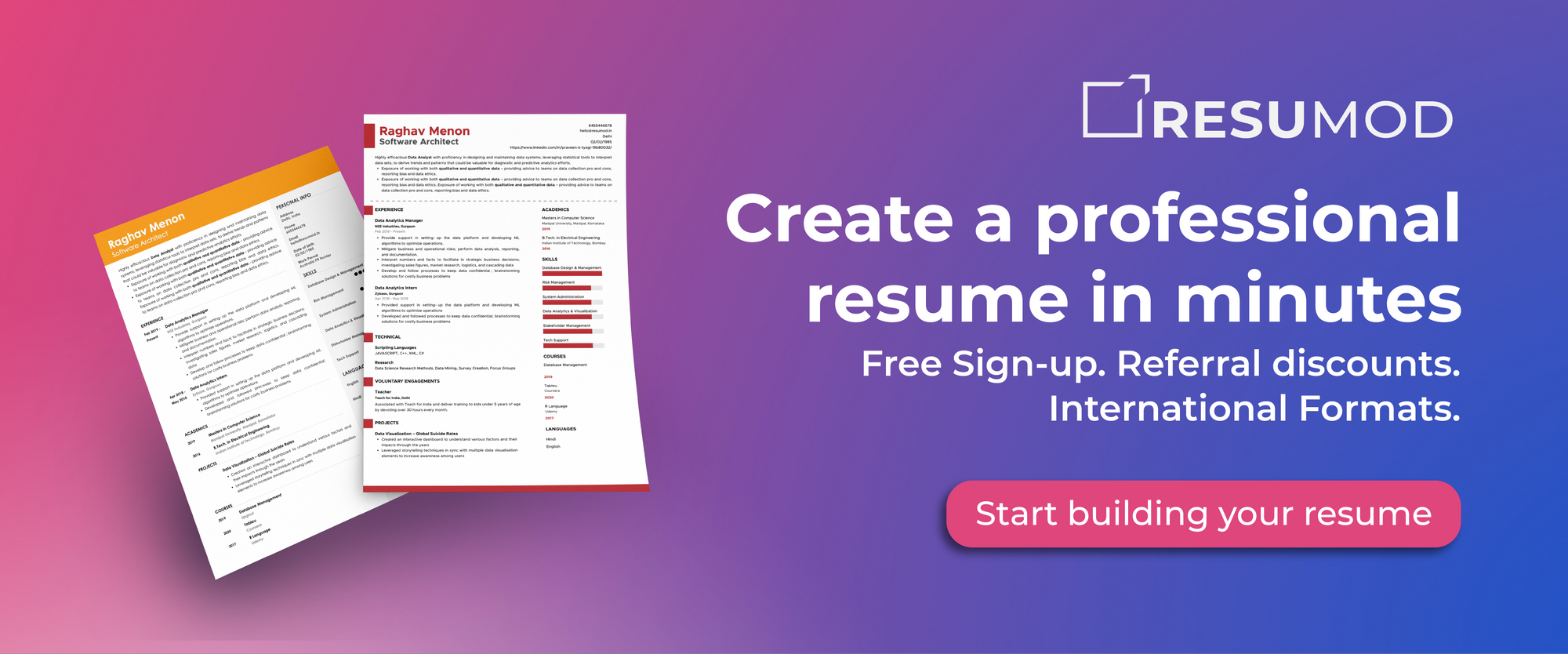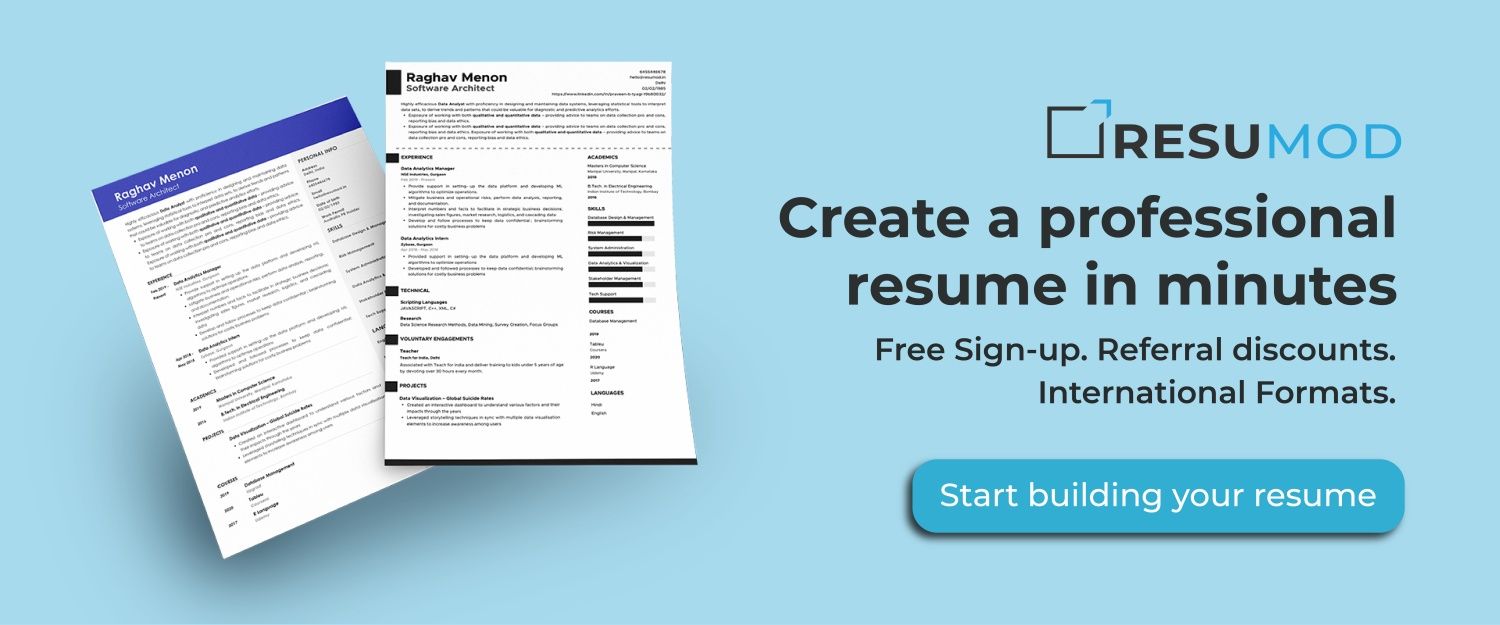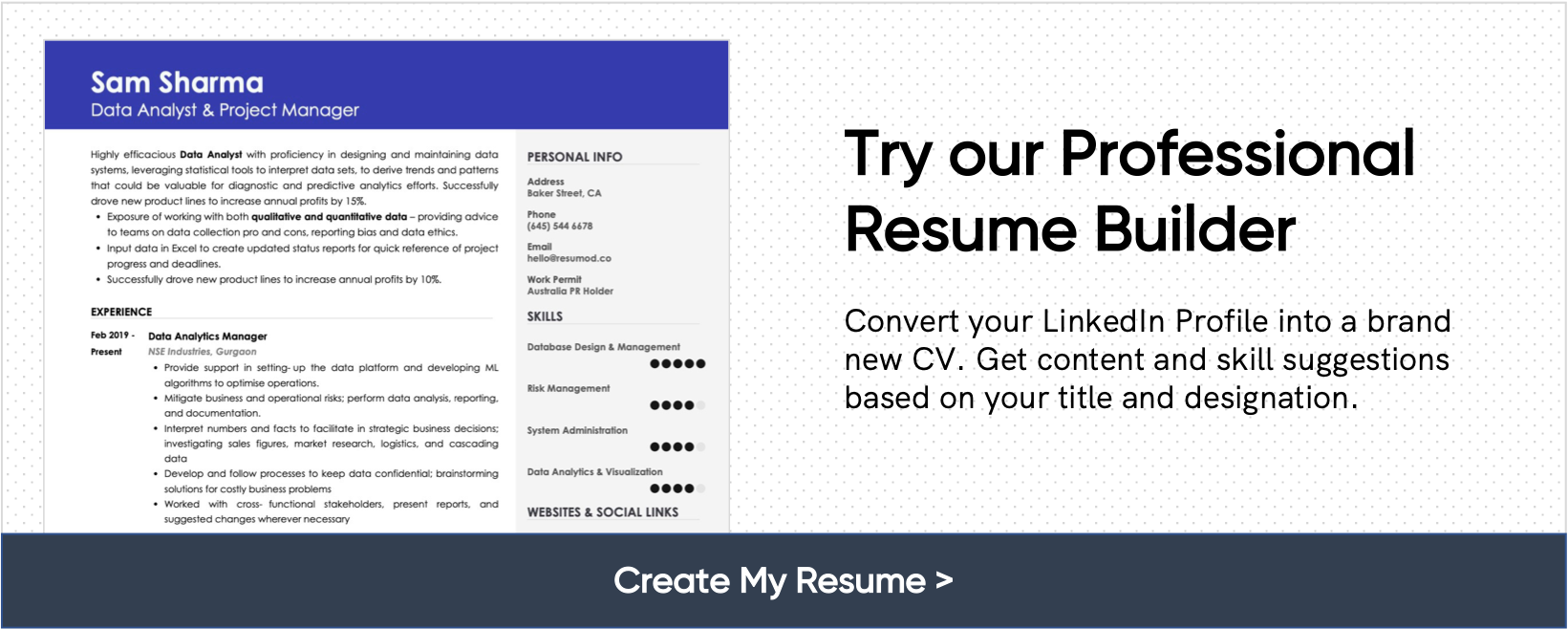150+ Skills Recruiters Want to See in Your Resume in 2024
A candidate who possesses both technical expertise and strong interpersonal skills is not only well-equipped to excel in their role but is also an asset to any organization.
Last year around this time, we heard the news of thousands of layoffs by giants Meta, Amazon and Google. Since then we witnessed a big shift in the job market and a sense of insecurity among candidates regarding the longevity of their jobs. Woth shifting trends and such In the competitive landscape of job hunting, a well-crafted resume can make all the difference. While showcasing your experience and qualifications is vital, one element often overlooked is the skills section.
- Strike the perfect balance between hard skills and soft skills
- The importance of listing your skills on your resume
- Over 150 popular niche skills for over 15 industries
- Top resumes on Resumod with key skills for 2024
Strike the perfect balance between hard skills and soft skills
One mistake that we see most job seekers making is just focusing on the hard skills. While they are key in conveying your capabilities to the recruiter, the job market is changing. With AI and remote work being the prominent trends, employers look for candidates with soft skills like adaptability, communication, and teamwork.
Therefore, you need to strike a balance between hard skills and soft skills.
Understanding Hard Skills and Their Significance
Hard skills are tangible and teachable abilities that can be quantified. For instance, a software developer's proficiency in programming languages or a data analyst's expertise in data analysis tools. These skills vary across industries, and a strong command of industry-specific hard skills is often a prerequisite for job success.
In the technology and IT sector, hard skills might encompass proficiency in programming languages such as Python or Java, database management skills, and expertise in cybersecurity protocols. These skills serve as the foundation for technical roles, establishing a candidate's competency in executing specific tasks and responsibilities.
Exploring Soft Skills and Their Role in the Workplace
On the flip side, soft skills are the interpersonal attributes and qualities that shape how we work with others. Effective communication, teamwork, problem-solving, and adaptability fall under this category. While hard skills showcase your technical abilities, soft skills highlight your ability to collaborate, lead, and contribute to a positive work environment.
Soft skills play a crucial role in every industry, influencing team dynamics, client relationships, and overall workplace culture. In a customer service role, for example, strong communication and empathy are paramount, ensuring smooth interactions with clients and resolving issues effectively.
Achieving the Right Balance for a Well-Rounded Professional Profile
The key to a standout resume in 2024 lies in achieving the right balance between hard and soft skills. A candidate who possesses both technical expertise and strong interpersonal skills is not only well-equipped to excel in their role but is also an asset to any organization. Striking this equilibrium is particularly essential as companies increasingly recognize the value of employees who bring a holistic skill set to the table.
The importance of listing your skills on your resume
A. Enhancing Visibility and Marketability
In the vast pool of job applicants, your resume is a personal marketing tool. The skills section serves as a beacon, guiding recruiters to recognize your unique strengths and expertise swiftly. By explicitly listing your skills, you make it easy for hiring managers to identify what sets you apart from the crowd. This visibility is crucial in catching the eye of recruiters during the initial screening process, ensuring that your application stands out among the numerous others vying for the same position.
Additionally, showcasing your skills enhances your marketability, making it clear to prospective employers what you bring to the table. Whether you excel in data analytics, project management, or graphic design, explicitly stating your capabilities gives employers a snapshot of your professional prowess and increases your appeal as a candidate.
B. Aligning with Job Requirements and Applicant Tracking Systems
Recruiters often sift through countless resumes to find the perfect match for a particular role. Listing your skills in alignment with the job requirements is essential in catching the attention of these hiring professionals. Tailoring your resume to mirror the skills outlined in the job description not only demonstrates your suitability for the position but also increases the likelihood of passing through Applicant Tracking Systems (ATS).
Many companies use ATS to automate the initial stages of the hiring process by scanning resumes for keywords and specific skill sets. If your resume aligns with the sought-after skills, it is more likely to navigate through these systems successfully, reaching the hands of recruiters for further consideration.
C. Showcasing Your Unique Value Proposition to Employers
Your skills represent the unique value you bring to a prospective employer. Beyond job responsibilities and educational qualifications, your skill set is a testament to what you can contribute to a team and an organization. By listing your skills, you are essentially telling employers, "Here's what I bring to the table, and here's how it can benefit your company."
Recruiters are not just looking for someone to fill a role; they are seeking candidates who will add value, solve problems, and contribute to the overall success of the organization. Your skills section becomes a powerful tool for communicating your unique value proposition, helping employers envision the positive impact you could make within their team and company.
As we navigate through the intricacies of listing skills on your resume, keep these foundational reasons in mind. Your skills are not just a list; they are a narrative of your professional story, and crafting this story strategically can significantly elevate your chances of landing your desired job.
Over 150 popular niche skills for over 15 industries
In today's dynamic job market, possessing a diverse skill set is essential for professional success. Whether you're an IT specialist, marketing guru, healthcare professional, finance expert, or educator, honing niche skills specific to your industry can set you apart from the competition. Here's a curated list of over 150 skills across 15 industries to help you craft a standout resume:
A. Technology and IT
Programming Languages
- Python
- Java
- C++
- JavaScript
- Ruby
Database Management
- SQL
- MongoDB
- Oracle
- MySQL
- PostgreSQL
Cybersecurity
- Ethical Hacking
- Network Security
- Cryptography
- Incident Response
- Security Assessment
B. Marketing and Communications
Content Creation
- Copywriting
- Blogging
- Video Production
- Graphic Design
- Editing
SEO and SEM
- Search Engine Optimization (SEO)
- Pay-Per-Click (PPC)
- Keyword Research
- Google Analytics
- AdWords
Social Media Management
- Social Media Strategy
- Community Building
- Analytics and Reporting
- Campaign Management
- Influencer Marketing
C. Healthcare
Medical Coding
- ICD-10 Coding
- CPT Coding
- Health Information Management
- Medical Billing
Patient Care
- Patient Assessment
- Vital Signs Monitoring
- Medication Administration
- Patient Education
Healthcare Administration
- Healthcare Policy
- Health Information Systems
- Medical Office Management
- Regulatory Compliance
D. Finance and Accounting
Financial Analysis
- Financial Modeling
- Risk Assessment
- Investment Analysis
- Data Analysis
Budgeting and Forecasting
- Budget Development
- Forecasting Techniques
- Expense Management
- Financial Planning
Auditing
- Internal Auditing
- External Auditing
- Compliance Auditing
- Fraud Examination
E. Education
Classroom Management
- Behaviour Management
- Lesson Planning
- Student Engagement
- Differentiated Instruction
Curriculum Development
- Educational Standards Alignment
- Instructional Design
- Assessment Strategies
- Learning Material Creation
Educational Technology
- Learning Management Systems (LMS)
- E-Learning Development
- Gamification in Education
- Technology Integration
This list is just the tip of the iceberg; tailor it to your specific industry and role to create a skills section that truly reflects your expertise and makes a lasting impression on recruiters. Remember, showcasing these skills in the context of your work experience and achievements will further strengthen your resume's impact.
Technical Skills
In today's technology-driven landscape, possessing a robust set of technical skills is indispensable across various industries. These skills not only demonstrate your proficiency in specific tools and technologies but also showcase your adaptability to the ever-evolving digital landscape.
- Meeting Industry Demands: Many industries are becoming increasingly digitized, and technical skills are necessary to keep up with the demands of the modern workplace. For example, in the field of healthcare, professionals are utilizing electronic health records, and in marketing, digital analytics tools are essential for effective campaigns.
- Enhancing Productivity: Technical skills often involve proficiency in tools and software that streamline processes and boost efficiency. Professionals with technical expertise can navigate and leverage these tools to enhance productivity, automate repetitive tasks, and achieve better outcomes in less time.
- Remaining Competitive: In a competitive job market, possessing technical skills relevant to your industry gives you a competitive edge. Employers seek candidates who not only have theoretical knowledge but can also apply that knowledge in practical, hands-on situations.
- Adapting to Innovation: Technology is constantly evolving, and professionals need technical skills to adapt to new tools, methodologies, and innovations. Whether it's adopting cloud computing, incorporating machine learning, or mastering the latest programming languages, staying technically proficient allows professionals to stay at the forefront of industry trends.
- Enabling Remote Work: With the rise of remote work, technical skills have become even more critical. Proficiency in collaboration tools, project management software, and other digital platforms is essential for effective communication and collaboration in virtual work environments.
- Cross-Functional Collaboration: In many workplaces, different departments collaborate on projects, and technical skills facilitate effective communication between teams. Professionals with a basic understanding of each other's technical requirements can bridge gaps and facilitate smoother collaboration.
- Addressing Complex Challenges: Many contemporary challenges require technical solutions. Whether it's cybersecurity threats, data analysis for informed decision-making, or developing sustainable technologies, technical skills are instrumental in addressing complex issues facing industries and society.
- Meeting Employer Expectations: Employers often include specific technical skill requirements in job descriptions. Job applicants who can demonstrate proficiency in these skills are more likely to align with employer expectations, making them attractive candidates for the role
Here's a breakdown of technical skills that can bolster your resume:
A. Web Development
- HTML, CSS, JavaScript
- Front-end Frameworks (e.g., React, Angular, Vue.js)
- Back-end Development (e.g., Node.js, Django, Ruby on Rails)
B. Data Science and Analytics
- Data Cleaning and Preprocessing
- Statistical Analysis (e.g., R, SPSS)
- Data Visualization (e.g., Tableau, Power BI)
C. Cloud Computing
- Amazon Web Services (AWS)
- Microsoft Azure
- Google Cloud Platform (GCP)
D. Project Management Tools
- Agile Methodology
- Jira, Trello, Asana
- Scrum Certification
E. Mobile App Development
- iOS (Swift)
- Android (Kotlin, Java)
- Cross-Platform Frameworks (e.g., Flutter, React Native)
Soft Skills
While technical skills are crucial, the significance of soft skills cannot be overstated. These interpersonal attributes and personal qualities contribute to a positive work environment, effective collaboration, and overall professional success. When crafting your resume, be sure to highlight the following soft skills that are highly sought after by recruiters:
A. Communication
- Verbal and Written Communication
- Active Listening
- Presentation Skills
B. Leadership
- Team Management
- Decision-Making
- Conflict Resolution
C. Adaptability
- Flexibility
- Resilience
- Problem-solving
D. Collaboration
- Teamwork
- Relationship Building
- Cross-functional Collaboration
E. Time Management
- Prioritization
- Meeting Deadlines
- Multitasking
Incorporating both technical and soft skills into your resume provides a holistic view of your capabilities as a professional. Remember to tailor these skills to match the requirements of the job you're applying for and showcase instances where you've successfully applied them in your previous roles.
Top resumes on Resumod with key skills for 2024
Resume of Oracle Procurement Application Developer

Check the full resume of Oracle Procurement Application Developer in text format here
Resume of Nutrition Researcher Food Scientist

Check the full resume of Nutrition Researcher Food Scientist in text format here
Resume of E-Commerce Developer

Check the full resume of E-Commerce developer in text format here
Resume of Corporate Partnership Marketing Manager

Check the full Resume of Corporate Partnership Marketing Manager in text format here
Resume of Azure Developer

Check the full resume of Azure Developer in text format here.
Resume of Archivist

Check the full resume of Archivist in text format here.
Resume of Fashion Design Graduate

Check the full resume of Fashion Design Graduate in text format here.
Resume of Industrial Designer

Check the full resume of Industrial Designer in text format here.
Resume of DevOps Software Developer

Check the full resume of DevOps software developer in text format here.
Resume of NLP Data Scientist

Check the full resume of NLP data scientist in text format here
Resume of Civil Engineering Graduate

Check the full resume of Civil Engineering Graduate in text format here.
Resume of Outside Sales Executive

Check the full resume of outside sales executive in text format here.
Resume of Talent Manager

Check the full resume of talent manager in text format here.
Resume of Chemical Plant Operator

Check the full resume of Chemical Plant Operator in text format here.
Resume of Senior Accountant

Resume of Front End Developer

Check the full resume of Front End Developer in text format here.
Resume of Head of Legal & Compliance

Check the full resume of head of legal & compliance in text format here
Resume of Content Marketing Manager

Final words
In this comprehensive guide, we've explored the intricate balance between hard and soft skills on your resume and why it matters. From understanding the significance of technical skills in an ever-evolving job market to acknowledging the vital role soft skills play in fostering effective collaboration, each section has shed light on essential aspects of crafting a compelling professional profile.
We delved into the reasons behind listing skills on your resume, emphasizing how it enhances visibility, aligns with job requirements, and showcases your unique value proposition to employers. Additionally, we provided insights into the strategic listing of over 150 popular niche skills across diverse industries.t
The job market is dynamic, and the skills that make you stand out today may evolve tomorrow. Hence, the journey of professional development is an ongoing one. Embracing a mindset of continuous skill development is paramount. Stay abreast of industry trends, invest in relevant certifications, and be proactive in acquiring new skills that align with the changing landscape of your field. The commitment to lifelong learning not only enhances your employability but also positions you as a forward-thinking and adaptable professional.
As you embark on the task of refining your resume, remember that one size does not fit all. Tailoring your resume for specific roles and industries is a strategic move that can significantly impact your job search success. Analyze job descriptions carefully, align your skills with the requirements of each position, and highlight experiences that showcase your proficiency in those areas. This personalized approach not only captures the attention of recruiters but also demonstrates your commitment to and understanding of the unique demands of the roles you're pursuing.
In closing, crafting a standout resume involves a delicate dance between the technical prowess required for the job and the soft skills that make you an invaluable team player. By embracing this balance and remaining committed to continuous growth, you're not just building a resume; you're sculpting a narrative of professional excellence that will resonate with employers across diverse industries. May your journey toward career advancement be marked by continuous learning, adaptability, and the confidence to showcase the unique skills that make you an asset in the workforce.



